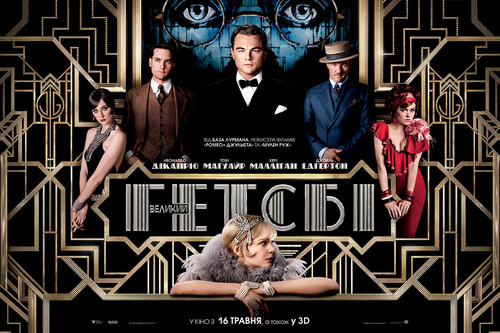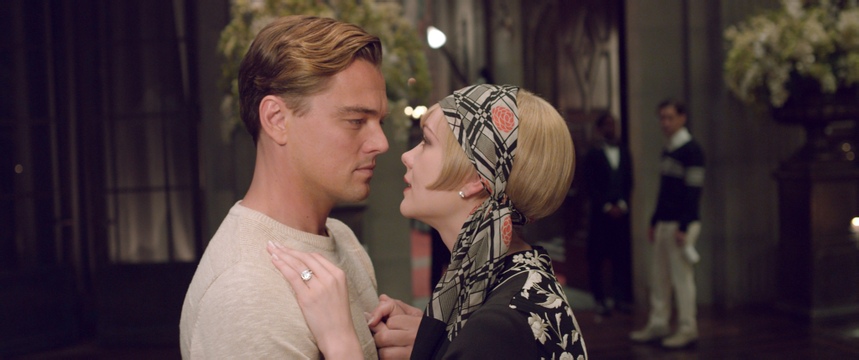"And as I stood there, brooding over on the old, unknown world, I thought of Gatsby's wonder when he first picked out the green light at the end of Daisy's dock. He had come a long way to this blue lawn, and his dream must have seemed so close that he could hardly fail to grasp it. He did not know that it was already behind him, somewhere back in that vast obscurity beyond the city, where the dark fields of the republic rolled on under the night."
The Great Gatsby, one of the great classics of twentieth-century American literature that has been filmed, unfolds through the perspectives of a man named Nick Carraway. Nick, Daisy's cousin, made the acquaintance of the fabulously wealthy Jay Gatsby in one of those huge, glamorous parties at Gatsby's estate in New York in the 1920's, and witnessed how his dreams were shattered and how his love for the beautiful Daisy Buchanan evolved into a tragedy.

Movie poster
"Gatsby believed in the green light, the orgiastic future that, year-by-year, recedes before us. It eluded us then, but that's no matter--tomorrow we will run faster, stretch out our arms farther...and, one fine morning--so, when we beat on, boats against the current, we will be borne back ceaselessly into the past."
Betrayed by Daisy while at war, Gatsby, a loyal lover, never gave up and waited five years, making himself an extremely wealthy man, buying a luxurious mansion right across the bay from where Daisy lived and, throwing lavish parties every weekend, just hoping she'd wander in one night and that he could win her back. The "green light" was the thing that sustained him unfailingly. Seeing the green light at the end of Daisy's dock, Gatsby felt married to Daisy and entertained a hope for the future when he could spend his life with Daisy.

A scene of the movie
I was quite impressed by Gatsby's extraordinary gift of hope, and his capacity to transform that hope into reality. This gift of hope motivated Gatsby who had been born terribly poor and then to become a wealthy man; who had lost Daisy only to seek to start over as if it were five years before.
However, it was also this gift of hope that ruined Gatsby. He indulged himself in the fantasy world he created, and wouldn't admit Daisy had already changed and that he could never repeat the past. So he ended up feeling "empty" and losing not only Daisy, but also his wealth and fame, even his life. I feel sorry for Gatsby. If he had not squandered his money those years, pursing something not worthy of him, and made the best of his business talents, he could have led a more meaningful life.
"They were careless people, Tom and Daisy -- they smashed up things and creatures and then retreated back into their money or their vast carelessness, or whatever it was that kept them together and let other people clean up the mess they had made..."
For Gatsby, Daisy was his goddess, the embodiment of his dreams. Yet, Daisy fell far short of Gatsby's ideals. She was beautiful and charming, but also fickle, shallow, bored, and sardonic, one who was only in love with money, ease, and material luxury. She was capable of affection, but not of sustained loyalty or care. When Gatsby took the blame for killing Myrtle Wilson (the mistress of Daisy's husband Tom) even though Daisy was driving the car, Daisy did not stand up and shoulder her responsibility. When Gatsby was murdered, Daisy was among those who sent neither a message nor a wreath and, sadly, Nick was the only person who cared. When the funeral for Gatsby was held, Daisy had already embarked on her journey to Europe with Tom. So cruel and cold-hearted was this "extraordinary nice girl"! Apparently Daisy represents the amoral values of the aristocratic East Egg set.
As a matter of fact, the movie somewhat reflects the post-World War I American society, before the economic crisis struck, when hedonism and sensualism reigned. The whole country seemed to bathe in the economic boom but people were not happy at all. America's powerful optimism, vitality, and individualism became subordinated to the amoral pursuit of wealth. A great many were striving for wealth and extravagance but suffered loneliness at heart. Jealousy, slander and distrust caused people to drift apart. As Nick states, there was a "quality of distortion" to life in New York, and this lifestyle made him lose his equilibrium. In such a fundamentally corrupt society, it was very hard for ambitious and decent young men like Gatsby to fulfill their "American dreams".
At the end of the movie, Nick left New York in despair, disgusted with everyone and everything except for the great Gatsby.
"They are a rotten crowd. You are worth the whole damn bunch put together." These were the last words Nick said to Gatsby.
Yes, Gatsby is great. I think his greatness lies in not only his gift of hope, but also his ongoing pursuit of dreams, his capacity to transform his hope into reality and his love and loyalty. Gatsby's tragedy saddens us though, his spirit will live on, inspiring many.

